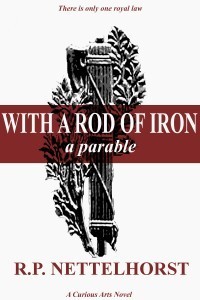What Matters to God
How important is freedom, anyhow? When God created Adam and Eve, he put them in a garden with abundant food, in pleasant conditions. But he gave them a rule: they could eat from every tree in that garden they wanted save one: the tree of the knowledge of good and evil. It was one of two trees that were unusual. The other tree was called the tree of life. There was no prohibition on eating the fruit from that tree.
But one day while Eve was wandering about the garden, she met the serpent, who asked her some questions. The first question was: “Did God really say, ‘You must not eat from any tree in the garden?”
Eve set the serpent straight. “We may eat fruit from the trees in the garden, but God did say, ‘You must not eat fruit from the tree that is in the middle of the garden, and you must not touch it, or you will die.’”
The serpent then decided to set Eve straight, “You will not surely die. God knows that when you eat of it your eyes will be opened, and you will be like God, knowing good and evil.”
Eve looked at the fruit, noticed that it was edible and pretty. More than that, it carried the promise of wisdom. So she took the fruit, ate it, and shared it with Adam, who also ate it.
The result was expulsion from the Garden of Eden, a series of curses on Adam and Eve, the worst being that they would be mortal and die. God set angels in place to make sure that Adam and Eve would not be able to get back to the garden; he did not want them to eat from the Tree of Life, because if they did, they would then live forever.
One of several lessons that is obvious from the story is that forcing humans to be good is not the most important thing for God. If it were, then why did he permit them to make a bad choice with the tree of the knowledge of good and evil? Why did he set up such a choice in the first place? Could it be that the right to choose—the right to be free—was more important to God than anything else? Apparently human freedom was worth the possibility of all the horrors of human history that grew out of that first poor choice. When people are free, they can make good choices, they can become anything they want—but equally, they can make bad choices and become something reprehensible.
But when one stops to think about which sort of society one would prefer to live in: a liberal western democracy or a totalitarian dictatorship—one can begin to understand why God made the choice he made: freedom is better than tyranny, even if tyranny is more orderly. Freedom is messy, but that’s better than any alternative.
* * *
 Another of my books, this time a bit of Christian science fiction or satire, With a Rod of Iron: A Parable, is available for the Kindle. In this book, Jesus comes back, much to the surprise of the Israelis who were facing another war. The Palestinians who were attacking the Israelis were even more shocked when the sky opened up and Jesus rode into Jerusalem on a white horse. But the most shocked people of all were the Christians. In fact, many were so surprised by what happened that they decide it was a “strong delusion” and that the man who rode into Jerusalem was none other than the Antichrist himself.
Another of my books, this time a bit of Christian science fiction or satire, With a Rod of Iron: A Parable, is available for the Kindle. In this book, Jesus comes back, much to the surprise of the Israelis who were facing another war. The Palestinians who were attacking the Israelis were even more shocked when the sky opened up and Jesus rode into Jerusalem on a white horse. But the most shocked people of all were the Christians. In fact, many were so surprised by what happened that they decide it was a “strong delusion” and that the man who rode into Jerusalem was none other than the Antichrist himself.
When Jesus arrived in the first century, he was not accepted by the religious establishment. He did not behave according to their expectations of the Messiah. He didn’t measure up. Even Jesus’ own disciples didn’t understand what was really going on. In fact, they didn’t fully comprehend what Jesus was all about until after Pentecost.
So why do we imagine that we will be any more clued in when he comes the second time? And will the religious establishment react any differently the second time around, if Jesus once again fails to perform according to their expectations?



